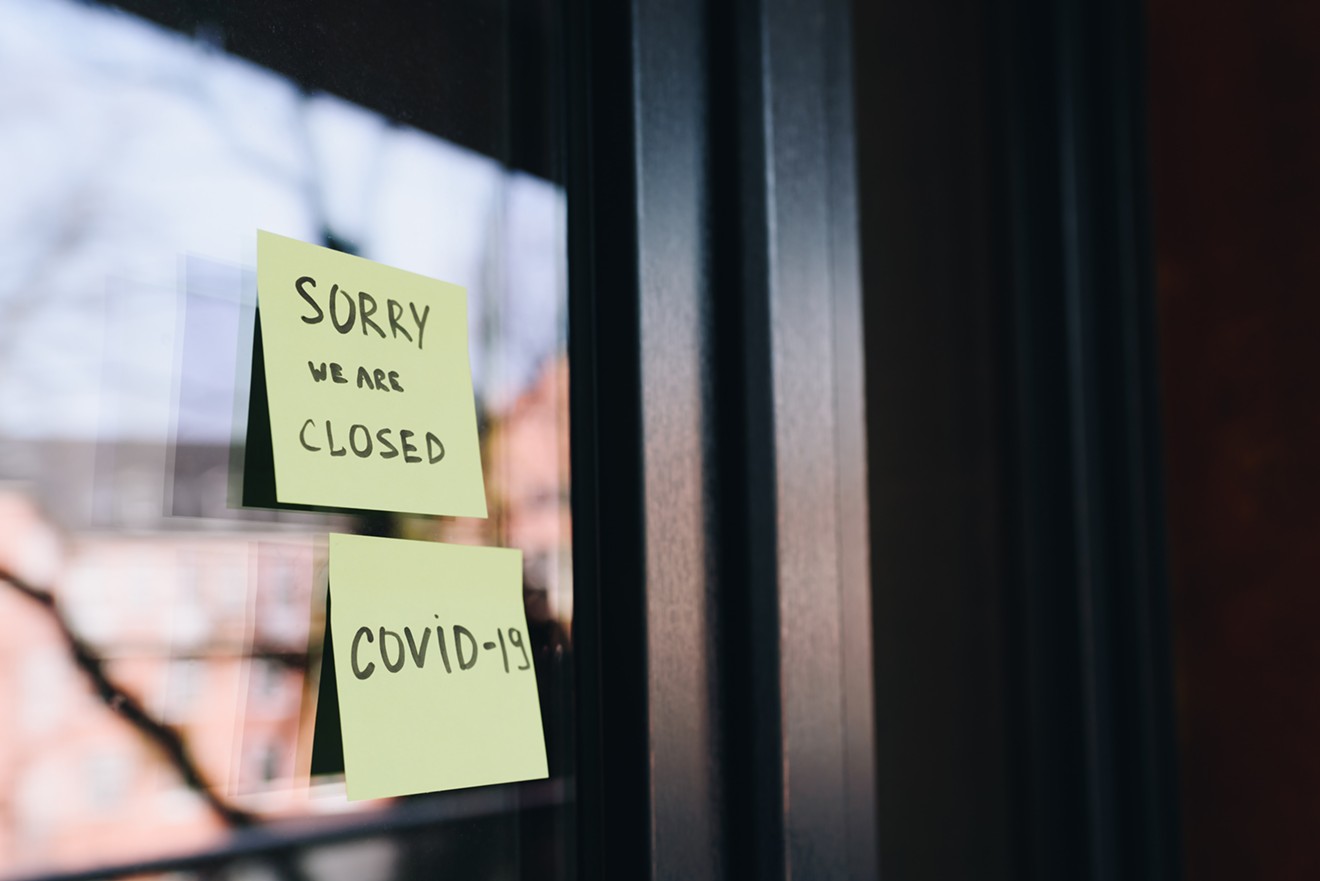Cancellations and postponements are nothing new in the days of the pandemic, but concert plans haven't been this nebulous since the days of mandated lockdowns and before COVID passports. Just recently, high-profile concerts such as Elton John's two-night stay at the American Airlines Center moved from January to March.
North Texas' smaller venues are seeing omicron's damage most closely, however. The local musicians who fill these smaller venues nights and weekends do not have the same protection as Elton John, and if he can test positive for COVID, the guitarist who spends his day stacking pallets and loading trucks definitely isn't immune.
"The omicron surge has had a significant impact on business," Rubber Gloves general manager and talent buyer Chadwick Witherspoon says. "We are a venue first and a bar second, so if a show falls through we are left with an empty room and a staff with empty pockets."
Venues like Rubber Gloves in Denton have maintained strict COVID-19 requirements for entry in order to keep customers and staff safe until we arrive at whatever the "new normal" looks like. These cancellations and postponements can have a broader impact on everyone involved in a venue's operations, as Main At South Side managing partner Ryan Higgs suggests.
"It is the new normal and the consequences are grim for the future of small venues and large venues alike," Higgs says. "This also hurts the artists, promoters, crews, employees, not just the venues. It is truly a mess with no end in sight. I would expect more venue closings over the next year."
The problem goes even further than those associated with a specific venue. In an entertainment district such as Deep Ellum, every business is affected when a big show at The Factory in Deep Ellum is canceled and the 4,300 people that fill its space do not come into the neighborhood that night.
"Local concerts and events play a big role in additional revenue in the Deep Ellum area," says Eric Bradford, chief operating officer of The Factory in Deep Ellum and The Studio at the Factory. "We definitely want to return to a sense of normality and help out the neighborhood, but event postponements and cancellations are still kind of a wake-up call indicating that our industry is still being impacted."
Some venues qualified for the Shuttered Venue Operators Grant (SVOG), which provides emergency assistance for eligible venues affected by COVID-19.
"We were fortunate enough to receive assistance from the SVOG program," Witherspoon says, "which allows us to still keep staff paid as these cancellations pop up. When we do have a show, it is amazing."
Other venues, such as Tulips in Fort Worth, were not so lucky.
"It becomes increasingly challenging when venues like ours, that did not qualify for any government grants like the SVOG or PPP, depend on a consistent flow of concerts to keep our business alive," Tulips owner Jason Suder says. "We lost nine shows in 2022 and spent our New Year's scurrying to fill a four-band bill when half the artists had to back out due to COVID."
Suder adds that these cancellations are damaging on a local and national level, as agencies are less likely to send other artists to Fort Worth when they see dismal attendance. Also, if you have balked at the high price of tickets for local shows, this is why.
"Ticket sales fluctuate wildly in the best of times," Suder says, "and we are seeing low sales compounded by lower attendance rates on regular nights."
Other venues are adjusting to this "new normal" by anticipating cancellations and postponements and keeping the venue as booked up as possible so any one cancellation does not tank the whole venue.
"Cancellations and postponements are a part of the business these days," Haltom Theater co-owner and manager Chaz Buchanan says. "Every week there’s a band or an act that cancels. You have to expect issues or drop-offs on each show. If you don’t, you will get burnt. ... The Haltom, on average, runs four to six events a week, and it is not an exaggeration to say that nearly every show has a possibility of being canceled at any time. Thankfully we run so many shows that most of them happen."
"It is the new normal and the consequences are grim for the future of small venues and large venues alike ... It is truly a mess with no end in sight. I would expect more venue closings over the next year." – Main At South Side managing partner Ryan Higgs
tweet this
Buchanan, like all of the venue owners and operators with whom we spoke, holds on to the hope that the shows that happen do well enough to make up for those that get pushed back or canceled, but after two years of performing the balancing act that is managing a venue during a pandemic, many do not see an end in sight.
"Watching omicron infections taper does offer encouragement as what we need is a light at the end of the tunnel," Suder says. "[We] continue to fight to provide this service to artists, musicians and those who need the artistry to get through our days."
The best way to keep these important establishments alive is to frequent them as much as possible and stick closely to the COVID protocols the venue has in place.
"Hopefully, people still go out to see live shows to support local venues and artists," Buchanan says. "We could all use it."
While all of the venue owners and operators we spoke to are mostly concerned with keeping their business afloat, each of them maintained that the purpose of even having a venue was to provide a space for people to unwind from stressors like a global pandemic.
"After months of stewing in our bedrooms, people are ready to get back out there and share ideas in a public space," Witherspoon says.
"We need the escape from these pains, anxieties and lonely moments to come together for something much larger than the sum of our individual stories," Suder concludes. "We build memories together and knit the fabric of our community in music venues, and we need to figure out a way to get social mores back on track for the emotional benefit of everyone."












